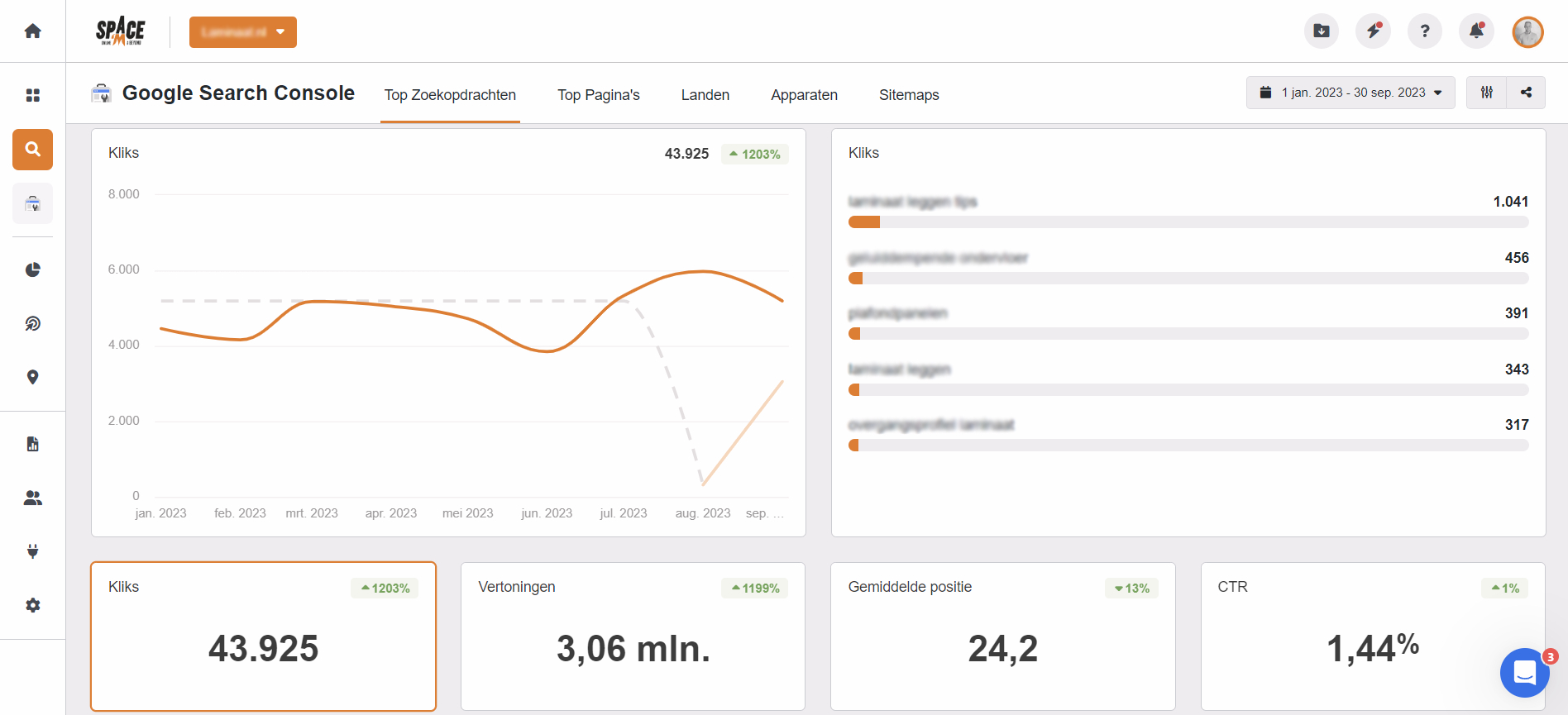Ben je al bekend met het uitvoeren van een zoekwoorden onderzoek voor jouw website? Zo ja, dan weet je waarschijnlijk hoe essentieel dit proces is voor het optimaliseren van je online aanwezigheid en het aantrekken van de juiste doelgroep.
Maar als je van plan bent jouw bedrijf uit te breiden naar internationale markten, dan is een standaard zoekwoorden onderzoek niet voldoende. Hier komt het internationaal zoekwoorden onderzoek om de hoek kijken.
Het uitvoeren van een internationaal zoekwoorden onderzoek gaat een stap verder dan het traditionele proces. Het is niet alleen een kwestie van de bestaande zoekwoorden vertalen naar een andere taal.
Een zorgvuldig uitgevoerd internationaal zoekwoorden onderzoek vormt de basis van jouw internationale SEO-strategie. Het helpt je niet alleen om de juiste doelgroep in verschillende landen te bereiken, maar ook om te begrijpen hoe verschillende culturen en talen jouw zoekwoord strategie kunnen beïnvloeden.
Hoe verschilt een buitenlands zoekwoorden onderzoek van een binnenlands onderzoek?
Wanneer je een zoekwoorden onderzoek doet voor een niche in Nederland, baseer je de strategie op de taal en de zoekgewoonten van jouw doelgroep binnen Nederland. Je zou kunnen denken dat het uitbreiden naar een internationale markt slechts een kwestie is van jouw zoekwoorden vertalen naar de relevante taal.
Echter, een effectief internationaal zoekwoorden onderzoek gaat verder dan alleen vertalen. Het houdt rekening met de unieke manier waarop mensen in verschillende landen informatie zoeken en gebruiken op het internet. Zoekwoorden die in Nederland populair zijn, kunnen in een ander land minder relevant zijn of zelfs een geheel andere betekenis hebben.
Daarom is het belangrijk om de belangrijkste verschillen van een buitenlands zoekwoorden onderzoek te begrijpen, zodat je jouw SEO-strategie effectief kunt aanpassen en optimaliseren voor een internationaal publiek.
Taal (lokalisatie)
Een simpele vertaling van jouw zoekwoorden is vaak niet voldoende om te voldoen aan de behoeften van lokale gebruikers. Dit komt doordat elk land zijn eigen taalnuances, dialecten, en soms zelfs unieke uitdrukkingen heeft die invloed hebben op zoekgedrag.
Bijvoorbeeld, een woord dat in Nederland gebruikt wordt, kan in België een heel andere betekenis hebben, ondanks dat beide landen Nederlands spreken. Daarom is lokalisatie – het proces van het aanpassen van jouw content en zoekwoorden aan lokale gebruiken en taalgebruik – essentieel.
Bij het lokaliseren van zoekwoorden moet je rekening houden met verschillende factoren, zoals lokale dialecten en jargon, en zelfs de manier waarop lokale markten specifieke producten of diensten beschrijven.
Dit betekent dat je soms af moet wijken van directe vertalingen en moet zoeken naar termen die daadwerkelijk resoneren met de lokale doelgroep. Zo kunnen zoekwoorden die in het ene land populair zijn, in een ander land minder zoekvolume of relevantie hebben, of zelfs negatieve connotaties dragen.
Culturele verschillen
Culturele verschillen en nuances hebben een significante invloed op het zoekgedrag van gebruikers in verschillende landen. Wat in het ene land als normaal zoekgedrag wordt beschouwd, kan in een ander land als ongebruikelijk of irrelevant worden gezien.
Deze verschillen kunnen variëren van algemene interessegebieden tot specifieke manieren waarop producten of diensten worden gezocht en gewaardeerd. Kennis van lokale zoekintenties en het begrijpen van hoe culturele aspecten de zoekopdrachten beïnvloeden, is daarom essentieel.
Zo kunnen bepaalde zoekopdrachten tijdens feestdagen of lokale evenementen pieken in populariteit. Dit soort inzichten kunnen je helpen om je content en zoekwoorden strategisch te plannen rond deze gebeurtenissen.
Daarnaast kan de manier waarop mensen informatie consumeren en waarde hechten aan verschillende soorten content sterk variëren. Het begrijpen van deze culturele nuances kan je helpen om effectiever te communiceren met je doelgroep en de relevantie van je website in verschillende markten te verhogen.
Zoekmachinegebruik
Het marktaandeel van zoekmachines kan sterk variëren per land, wat een aanzienlijke invloed heeft op jouw internationale SEO-strategie. Hoewel Google in veel landen dominant is, zijn er regio’s waar lokale zoekmachines de voorkeur hebben.
In China is bijvoorbeeld Baidu de leidende zoekmachine, terwijl in Rusland Yandex een grote speler is. Dit betekent dat je niet alleen jouw zoekwoorden moet aanpassen aan de taal en cultuur van het land dat je wilt targeten, maar ook aan de specifieke algoritmes en optimalisatie regels van de dominante zoekmachines in die markten.
Het aanpassen van jouw strategie aan verschillende zoekmachines vereist onderzoek naar hun unieke algoritmes, gebruikersgedrag, en voorkeuren. Dit kan betekenen dat je verschillende SEO-technieken moet toepassen of jouw content anders moet structureren om beter te presteren op deze platforms.
Lokale markttrends
Het begrijpen van lokale markttrends is van cruciaal belang voor het succesvol uitvoeren van een internationaal zoekwoorden onderzoek. Seizoensgebonden zoekopdrachten, lokale evenementen, en specifieke consumentenvoorkeuren kunnen allemaal een grote invloed hebben op het zoekgedrag.
Bijvoorbeeld, tijdens een zoekwoorden onderzoek voor de Amerikaanse markt, zou je kunnen ontdekken dat er rond Thanksgiving een piek is in zoekopdrachten naar ‘kalkoen recepten’. Echter zal deze trend waarschijnlijk niet relevant zijn in landen waar Thanksgiving niet wordt gevierd.
Neem daarnaast seizoensgebonden producten of diensten; wat in het ene land tijdens de zomermaanden populair is, kan in een ander land relevanter zijn tijdens de winter. Het analyseren van deze trends vereist toegang tot lokale marktgegevens en het vermogen om deze informatie te vertalen naar effectieve SEO-strategieën.
Het monitoren van lokale markttrends helpt je niet alleen bij het vinden van relevante zoekwoorden, maar ook bij het aanpassen van jouw content kalender en marketingcampagnes aan de lokale vraag. Dit zorgt voor een meer gerichte en effectieve benadering van internationale markten, waardoor je jouw kansen op succes in verschillende regio’s maximaliseert.
Hoe voer je een internationaal zoekwoorden onderzoek uit?
Het uitvoeren van een internationaal zoekwoorden onderzoek volgt in essentie dezelfde basisprincipes als een binnenlands onderzoek, maar vereist extra stappen en overwegingen om succesvol te zijn.
De eerste stap is altijd het begrijpen van je eigen markt en het identificeren van kern zoekwoorden die relevant zijn voor jouw bedrijf. Deze zoekwoorden vormen de basis van je internationale keyword onderzoek.
Na deze initiële stap zijn er enkele cruciale verschillen en aanvullende stappen die je moet nemen om een effectief internationaal zoekwoorden onderzoek uit te voeren. Deze stappen omvatten het vertalen en lokaliseren van zoekwoorden, het begrijpen van lokale zoekmachines en markttrends, en het valideren van de effectiviteit van je zoekwoorden in verschillende markten.
1. Identificeer je target keywords
Het identificeren van je target keywords is de eerste stap in elk zoekwoorden onderzoek, ongeacht of het om een binnenlands of internationaal onderzoek gaat.
In deze fase voer je een gedetailleerd onderzoek uit in je eigen taal om de lokale markt te begrijpen. Dit helpt je om een solide basis te leggen voor het zoeken naar de juiste keywords in andere talen. Kijk hierbij naar zoekvolumes, de moeilijkheidsgraad van zoekwoorden, en de zoekintentie achter de zoekopdrachten.
Door deze elementen grondig te analyseren, kun je een lijst met relevante zoekwoorden samenstellen die als uitgangspunt dienen voor jouw internationaal zoekwoorden onderzoek. Dit is een cruciale stap, omdat het de richting bepaalt waarin je jouw onderzoek en SEO-strategie voor verschillende markten zult ontwikkelen.
2. Vertaal de zoekwoorden
Na het vaststellen van een solide basis van target keywords in je eigen taal, is de volgende stap het vertalen van deze zoekwoorden naar de taal van de doelmarkt. Het is belangrijk om te benadrukken dat hoewel dit een cruciale stap is, het slechts het begin is. Eenvoudigweg vertalen is niet voldoende om een effectief internationaal zoekwoorden onderzoek uit te voeren.
Het vertalen van keywords zorgt ervoor dat je een basislijst van potentiële target keywords hebt in de taal van de markt die je wilt betreden. Echter, zoals we al vaker hebben verteld, is het cruciaal om deze vertaalde zoekwoorden verder te lokaliseren en te valideren om hun effectiviteit in de doelmarkt te verzekeren.
3. Zoekwoorden lokaliseren
Het lokaliseren van zoekwoorden is een essentiële stap in het uitvoeren van een gedegen internationaal zoekwoorden onderzoek. Na het vertalen van de basislijst van zoekwoorden, moet je deze aanpassen om te voldoen aan de specifieke behoeften en het zoekgedrag van gebruikers in de doelmarkt.
Lokalisatie gaat verder dan eenvoudige vertaling; het houdt in dat je rekening houdt met culturele nuances, lokale uitdrukkingen, en zelfs de specifieke manier waarop mensen in verschillende landen naar informatie zoeken.
Een voorbeeld van het belang van lokalisatie is het zoekwoord ‘supermarkt’. Zo zal er in Amerika sneller verwezen worden naar ‘grocery store’, terwijl een Brit meestal de term ‘supermarket’ gebruikt. Dit benadrukt het belang van het lokaliseren van keywords.
Wanneer je zoekwoorden lokaliseert, moet je dus onderzoek doen naar hoe lokale markten bepaalde producten of diensten beschrijven en welke termen zij gebruiken om ernaar te zoeken.
Deze stap vereist diepgaand marktonderzoek en soms het raadplegen van lokale SEO-experts of native speakers die inzicht kunnen bieden in de meest effectieve manier om jouw zoekwoorden aan te passen voor de doelmarkt.
4. Valideer de bruikbaarheid van je keywords
Nadat je de zoekwoorden hebt vertaald en gelokaliseerd, is het belangrijk om de bruikbaarheid van deze keywords te valideren in de doelmarkt. Dit proces helpt je te bevestigen dat de gekozen zoekwoorden daadwerkelijk relevant zijn voor jouw doelgroep en potentieel hebben om verkeer naar jouw website te leiden.
Gelokaliseerde keywords valideren kan op verschillende manieren, zoals het gebruik van zoekwoorden onderzoek tools, het analyseren van concurrenten, en het inzetten van lokale marktkennis.
Tools zoals SEMRush, Ahrefs, en Google Keyword Planner kunnen je helpen bij het valideren van de bruikbaarheid van specifieke keywords. Deze tools bieden waardevolle inzichten in zoekvolume, concurrentie, en de relevantie van zoekwoorden in specifieke markten.
Door het gebruik van deze tools kun je specifiek zoeken op keywords in een bepaalde taal en, in sommige gevallen zelfs een specifieke geografische locatie, om zo de lokale zoekwoorden die het beste presteren te identificeren.
Daarnaast is het uitvoeren van een lokale concurrentieanalyse cruciaal. Kijk naar welke zoekwoorden jouw concurrenten in de doelmarkt gebruiken en hoe zij ranken. Dit geeft je niet alleen inzicht in de markt, maar helpt je ook om kansen te identificeren waar je mogelijk een voorsprong kunt nemen.
Door de bruikbaarheid van je zoekwoorden te valideren, zorg je ervoor dat je SEO-strategie is afgestemd op de werkelijke behoeften en zoekgedrag van de lokale markt, wat de effectiviteit van jouw internationale uitbreiding aanzienlijk kan verhogen.
Hoe een goed internationaal keyword onderzoek bijdraagt aan de internationale SEO-strategie
Een grondig en zorgvuldig uitgevoerd internationaal zoekwoorden onderzoek is de fundering van elke succesvolle internationale SEO-strategie. Door de juiste zoekwoorden te identificeren, vertalen, lokaliseren en valideren, leg je de basis voor het aantrekken van de juiste doelgroep in verschillende landen.
De inzichten verkregen uit een internationaal zoekwoorden onderzoek stellen je in staat om gerichte content te creëren die aansluit bij de zoekintenties en behoeften van lokale gebruikers. Dit leidt tot verbeterde zichtbaarheid, hogere click-through rates en uiteindelijk meer conversies.
Bovendien helpt een internationaal georiënteerde SEO-aanpak je om effectiever te concurreren op de wereldmarkt door beter te begrijpen hoe verschillende markten werken en wat daar leeft.
Samengevat, een internationaal zoekwoorden onderzoek is meer dan alleen een technische noodzaak; het is een strategisch instrument dat je helpt om culturele grenzen te overbruggen en jouw bedrijf succesvol te positioneren in diverse internationale markten.



















